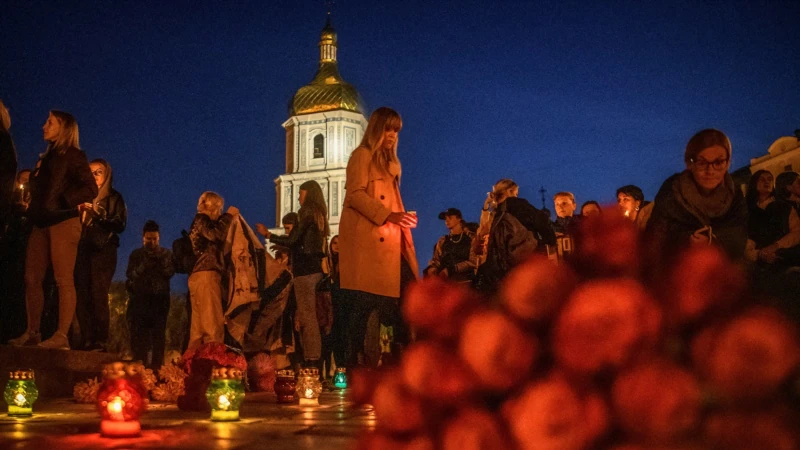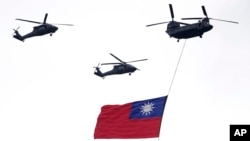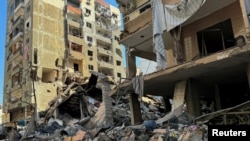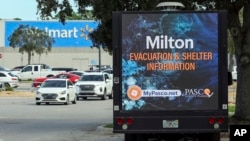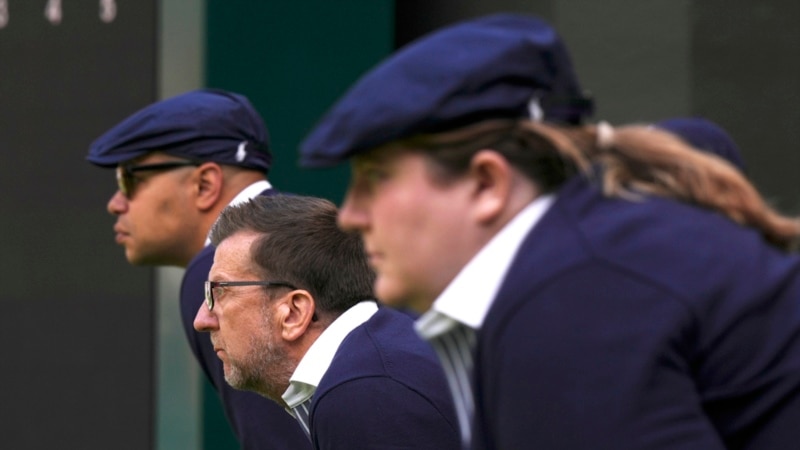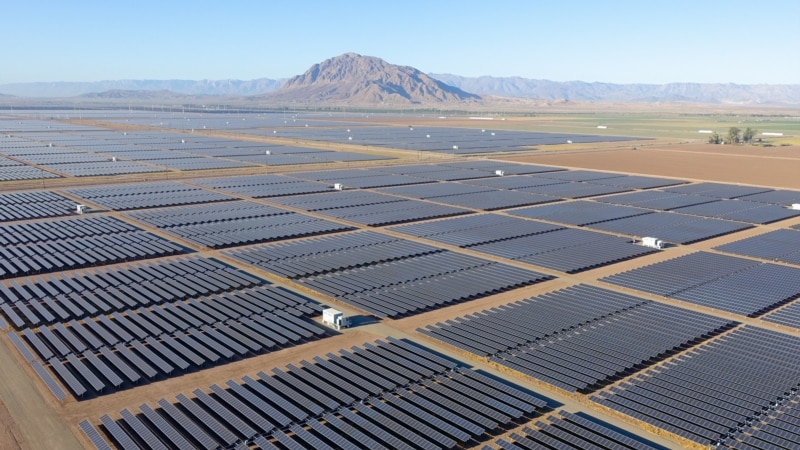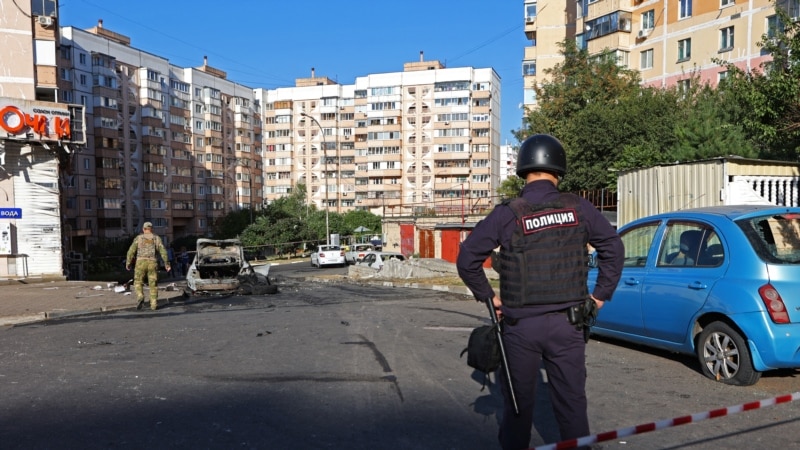For full coverage of the crisis in Ukraine, visit Flashpoint Ukraine.
The latest developments in Russia’s war on Ukraine. All times EDT.
12:05 p.m.: Russian President Vladimir Putin has criticized grain exports from Ukraine under a U.N.-brokered deal, claiming that they are failing to reach poorer countries as intended, and he warned that the current food crisis could intensify into a “humanitarian catastrophe,” RFE/RL reported.
The comments raise doubt about the fate of a six-week-old deal brokered by the United Nations and Turkey to ship millions of tons of grain from Ukraine’s blockaded ports.
Speaking at the Eastern Economic Forum in the eastern city of Vladivostok on September 7, Putin suggested that Moscow will “have to think about changing routes” for Ukrainian grain shipments.
Asked by Reuters whether Moscow had initiated changes in the grain-export deal, Ukrainian Agriculture Minister Mykola Solskiy said after Putin’s speech that “we have not seen anything at our level.”
Global food and energy prices have spiked since the start of Russia’s full-scale invasion to subdue smaller post-Soviet neighbor Ukraine.
11:00 a.m.: Ukrainian President Volodymyr Zelenskyy says he spoke to German Chancellor Olaf Scholz Tuesday and discussed plans for further strengthening Ukraine’s defense capabilities.
10:14 a.m.: Russian President Vladimir Putin said on Wednesday that journalists who have left the country had long held anti-Russian views and were looking for a pretext to leave, the Associated Press reported.
He also told the Eastern Economic Forum in Vladivostok that the awarding of last year’s Nobel Peace Price to a Russian independent journalist was a politically driven move.
Putin’s made those comments two days after a Russian court upheld the revocation of the license of the newspaper Novaya Gazeta, whose editor-in-chief Dmitry Muratov shared the 2021 Nobel prize.
Many journalists, both Russian nationals and foreigners, left the country following the passage in March of a law imposing severe penalties for comments that purportedly discredit the actions of Russian soldiers in Ukraine.
8:24 a.m.: Russia said on Wednesday it was imposing sanctions on a host of European Union citizens in response to what Moscow says is the West’s “unfriendly anti-Russian” policy.
In a statement, the foreign ministry said it was banning a number of the European military leaders, senior security figures and representatives of weapons companies from entering Russia. It did not name the individuals.
7:21 a.m.: The European Commission will propose a price cap on Russian gas, alongside measures including a mandatory EU cut in electricity use during peak hours, and a cap on the revenues of non-gas power generators, the bloc’s chief said on Wednesday.
“We will propose a price cap on Russian gas … We must cut Russia’s revenues which Putin uses to finance this atrocious war in Ukraine,” European Commission President Ursula von der Leyen told reporter
6 a.m.: Ukraine is looking at the option of shutting down its Russian-occupied Zaporizhzhia nuclear plant for safety reasons and is worried about the reserves of diesel fuel used for backup generators, Reuters reported Wednesday, citing Kyiv’s top nuclear safety expert.
The imperiled facility — Europe’s largest nuclear power plant — remains disconnected from the Ukrainian grid after shelling cut its external power lines. Moscow and Kyiv accuse each other of shelling the plant risking a nuclear disaster.
“The option of switching off the station is being assessed, if conditions necessitating the station to be switched off arise,” Oleh Korikov, acting head of Ukraine’s State Nuclear Regulatory Inspectorate, told a news briefing by video link.
He said the facility was supplying its own electricity needs, but that backup diesel generators would have to be fired up if it remained disconnected, though he gave no time frame for that eventuality.
He said it was extremely difficult to replenish the reserves of diesel because of Russia’s February 24 invasion. Moscow’s troops captured the plant in early March, but it is still operated by Ukrainian technicians.
“We could potentially reach a situation where the diesel runs out, which would cause an accident involving the damage of the active zones of the reactors, which would cause the expulsion of radioactive substances into the environment,” he said.
“This would have consequences not only for the territory of Ukraine, but also cross-border consequences,” he said.
Shutting down the vast, six-reactor nuclear plant would pile further strain on Ukraine which is already bracing for a winter of energy shortages as the war rages on in its east and south.
5:30 a.m.: Russian President Vladimir Putin said Wednesday his country has not lost anything from its military operation in Ukraine and has strengthened Russia’s sovereignty.
Speaking at an economic forum, Putin said all of Russia’s actions “are directed at helping the people of the Donbas.”
“This will eventually lead to the strengthening of our country from the inside and in its foreign policy,” Putin said.
Russia invaded Ukraine in late February, and after abandoning a push toward the Ukrainian capital, Kyiv, has focused its military efforts in the Donbas region in eastern Ukraine where pro-Russian fighters have battled Ukrainian forces since 2014.
Putin also criticized an agreement brokered by the United Nations and Turkey that restarted Ukrainian grain shipments amid a global food crisis, saying the exports were not going to the world’s poorest countries.
4:30 a.m.: The Baltic states of Lithuania, Latvia and Estonia have reached agreement in principle to restrict the entry of Russian citizens traveling from Russia and Belarus, Latvian Foreign Minister Edgars Rinkevics said on Wednesday.
3:35 a.m.: A Ukrainian presidential adviser said on Wednesday that Russia had no grounds to review the landmark deal allowing Ukraine to export grain from ports in the Black Sea and that the terms of the agreement were being strictly observed, Reuters reported.
Mykhailo Podolyak, an adviser to Ukrainian President Volodymyr Zelenskiyy, made the comments to Reuters after Russian President Vladimir Putin said he would discuss amending the deal to limit the countries that can receive cargo shipments.
Podolyak described the remarks from Russia as “unexpected” and “groundless.”
3:05 a.m.: Russia’s Gazprom said it had signed an agreement to start switching payments for gas supplies to China to yuan and rubles instead of dollars, Reuters reported.
The shift is part of a push by Russia to reduce its reliance on the U.S. dollar, euro and other hard currencies in its banking system and for trade, a drive that Moscow has accelerated since it was hit with Western sanctions in response to its invasion of Ukraine.
Russia has been forging closer economic ties with China and other non-Western countries, in particular as new markets for its vital hydrocarbon exports.
2:30 a.m.: Russian President Vladimir Putin said on Wednesday that Moscow had done everything it could to ensure Ukraine was able to export grain, Reuters reported.
He said that problems on the global food market were likely to intensify and that a humanitarian catastrophe was looming.
2:20 a.m.: Turkish President Recep Tayyip Erdogan said Russia is cutting natural gas flows to Europe in retaliation for sanctions, adding that Europe is “reaping what it sowed,” Reuters reported.
Russia indefinitely halted the flows through the Nord Stream 1 pipeline and has cut or shut down supplies on three of its biggest westward gas pipelines since its invasion of Ukraine began on February 24. Oil supplies have also been redirected eastwards.
“Europe is actually reaping what it sowed,” Erdogan told reporters on Tuesday in Ankara on Tuesday, adding that sanctions drove Putin to retaliate using energy supplies.
“Putin is using all his means and weapons, and the most important of these is natural gas. Unfortunately — we wouldn’t want this but — such a situation is developing in Europe,” Erdogan said. “I think Europe will experience serious problems this winter. We do not have such a problem,” he added.
Turkey, which has Black Sea borders with both Russia and Ukraine, has said joining sanctions against Russia would have hurt its already strained economy and argued that it is focused on mediation efforts.
2 a.m.:
1:45 a.m.: Russian Foreign Minister Sergei Lavrov said on Wednesday Moscow had sent a request to the International Atomic Energy Agency, or the IAEA, requesting “additional explanations” on some areas in their report from a visit to the Zaporizhzhia nuclear power plant, Reuters reported, citing the Interfax news agency.
1:15 a.m.: A newly downgraded U.S. intelligence finding says the Russian Ministry of Defense is in the process of purchasing millions of rockets and artillery shells from North Korea for its ongoing fight in Ukraine.
“The information that we have is that Russia has specifically asked for ammunition,” Pentagon press secretary, Brig. Gen. Pat Ryder said. “I’m not able to provide any more details than that at this point in time. But it does demonstrate and is indicative of the situation that Russia finds itself in, in terms of its logistics and sustainment capabilities as it relates to Ukraine.”
A U.S. official says the fact Russia is turning to the isolated state of North Korea demonstrates that its military “continues to suffer from severe supply shortages in Ukraine, due in part to export controls and sanctions.”
The official spoke Monday on the condition of anonymity to discuss the intelligence determination.
National Security Council spokesman John Kirby said there were no indications that the arms purchase had occurred yet or that any North Korean munitions had made it onto the Ukrainian battlefield. Still, he said the talks alone were “just another indication of how desperate Putin’s becoming.”
12:05 a.m.: Five commercial vessels carrying a total of 129,538 metric tons of grain and other food products are expected to move Wednesday under the Black Sea Grain Initiative.
The five vessels that the Joint Coordination Center has authorized to move are:
- Seaguardian from Yuzhny/Pivdennyi to Cartagena, Spain, carrying 62,266 metric tons of barley, wheat, and sunflower seed.
- Super Henry from Odesa to Kenya, carrying 51,400 metric tons of wheat.
- Dignity from Chornomorsk to Turkey, carrying 8,200 metric tons of sunflower seed.
- Eliana from Chornomorsk to Tekirdag, Turkey, carrying 5,200 metric tons of sunflower oil.
- Kaptan Cevdet from Chornomorsk to Bandirma, Turkey, carrying 2,472 metric tons of soya beans.
As of Tuesday, the total tonnage of grain and other foodstuffs exported from the three Ukrainian ports is 2,212,972 metric tons. A total of 204 voyages (108 inbound and 96 outbound) have been enabled so far.
Some information in this report came from The Associated Press, Reuters and Agence France-Presse.

